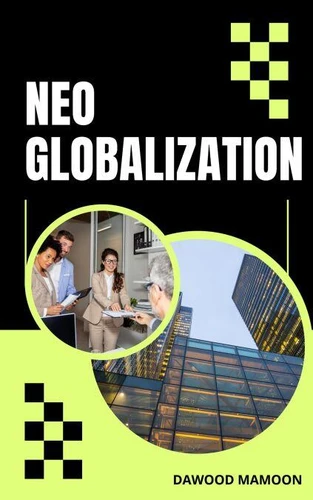Neo Globalization
Par :Formats :
Actuellement indisponible
Cet article est actuellement indisponible, il ne peut pas être commandé sur notre site pour le moment. Nous vous invitons à vous inscrire à l'alerte disponibilité, vous recevrez un e-mail dès que cet ouvrage sera à nouveau disponible.
Disponible dans votre compte client Decitre ou Furet du Nord dès validation de votre commande. Le format ePub est :
- Compatible avec une lecture sur My Vivlio (smartphone, tablette, ordinateur)
- Compatible avec une lecture sur liseuses Vivlio
- Pour les liseuses autres que Vivlio, vous devez utiliser le logiciel Adobe Digital Edition. Non compatible avec la lecture sur les liseuses Kindle, Remarkable et Sony
 , qui est-ce ?
, qui est-ce ?Notre partenaire de plateforme de lecture numérique où vous retrouverez l'ensemble de vos ebooks gratuitement
Pour en savoir plus sur nos ebooks, consultez notre aide en ligne ici
- FormatePub
- ISBN8231825417
- EAN9798231825417
- Date de parution02/06/2025
- Protection num.pas de protection
- Infos supplémentairesepub
- ÉditeurWalzone Press
Résumé
Neo-globalization, unlike the liberalization wave of the 1990s, promotes inclusivity by integrating historically marginalized economies such as Pakistan, much of Africa, and Latin America into dynamic regional value chains. This involves investing in interoperable infrastructure aligned with the Belt and Road Initiative and the Build Back Better World (B3W); developing digital trade corridors supported by multilateral funding.
and empowering sovereign innovation through joint technology hubs. Such cooperation fosters global South empowerment and leverages U. S.-China synergy rather than zero-sum antagonism. Peace unlocks stable, long-term trade flows, investment confidence, and equitable innovation, transforming competition into collective advancement. The future of American foreign policy lies not in the assertion of control, but in the cultivation of peace, dignity, and cooperative governance.
By transforming its strategic aims from hegemony to facilitation, and its metrics from might to justice, the United States can shape a world order that is both more secure and more just. As demonstrated by the peace-leaning strategies of both Joe Biden and Donald Trump, the architecture for post-hegemonic leadership already exists. What is required now is institutionalization, multilateral embedding, and civic legitimacy.
Rooted in institutional economics and inspired by J. Bradford DeLong's emphasis on historically contingent, inclusive growth, this book proposes a redefinition of strategic success: not in dominance, but in facilitation of global public goods, democratic pluralism, and technological stewardship.
and empowering sovereign innovation through joint technology hubs. Such cooperation fosters global South empowerment and leverages U. S.-China synergy rather than zero-sum antagonism. Peace unlocks stable, long-term trade flows, investment confidence, and equitable innovation, transforming competition into collective advancement. The future of American foreign policy lies not in the assertion of control, but in the cultivation of peace, dignity, and cooperative governance.
By transforming its strategic aims from hegemony to facilitation, and its metrics from might to justice, the United States can shape a world order that is both more secure and more just. As demonstrated by the peace-leaning strategies of both Joe Biden and Donald Trump, the architecture for post-hegemonic leadership already exists. What is required now is institutionalization, multilateral embedding, and civic legitimacy.
Rooted in institutional economics and inspired by J. Bradford DeLong's emphasis on historically contingent, inclusive growth, this book proposes a redefinition of strategic success: not in dominance, but in facilitation of global public goods, democratic pluralism, and technological stewardship.
Neo-globalization, unlike the liberalization wave of the 1990s, promotes inclusivity by integrating historically marginalized economies such as Pakistan, much of Africa, and Latin America into dynamic regional value chains. This involves investing in interoperable infrastructure aligned with the Belt and Road Initiative and the Build Back Better World (B3W); developing digital trade corridors supported by multilateral funding.
and empowering sovereign innovation through joint technology hubs. Such cooperation fosters global South empowerment and leverages U. S.-China synergy rather than zero-sum antagonism. Peace unlocks stable, long-term trade flows, investment confidence, and equitable innovation, transforming competition into collective advancement. The future of American foreign policy lies not in the assertion of control, but in the cultivation of peace, dignity, and cooperative governance.
By transforming its strategic aims from hegemony to facilitation, and its metrics from might to justice, the United States can shape a world order that is both more secure and more just. As demonstrated by the peace-leaning strategies of both Joe Biden and Donald Trump, the architecture for post-hegemonic leadership already exists. What is required now is institutionalization, multilateral embedding, and civic legitimacy.
Rooted in institutional economics and inspired by J. Bradford DeLong's emphasis on historically contingent, inclusive growth, this book proposes a redefinition of strategic success: not in dominance, but in facilitation of global public goods, democratic pluralism, and technological stewardship.
and empowering sovereign innovation through joint technology hubs. Such cooperation fosters global South empowerment and leverages U. S.-China synergy rather than zero-sum antagonism. Peace unlocks stable, long-term trade flows, investment confidence, and equitable innovation, transforming competition into collective advancement. The future of American foreign policy lies not in the assertion of control, but in the cultivation of peace, dignity, and cooperative governance.
By transforming its strategic aims from hegemony to facilitation, and its metrics from might to justice, the United States can shape a world order that is both more secure and more just. As demonstrated by the peace-leaning strategies of both Joe Biden and Donald Trump, the architecture for post-hegemonic leadership already exists. What is required now is institutionalization, multilateral embedding, and civic legitimacy.
Rooted in institutional economics and inspired by J. Bradford DeLong's emphasis on historically contingent, inclusive growth, this book proposes a redefinition of strategic success: not in dominance, but in facilitation of global public goods, democratic pluralism, and technological stewardship.



